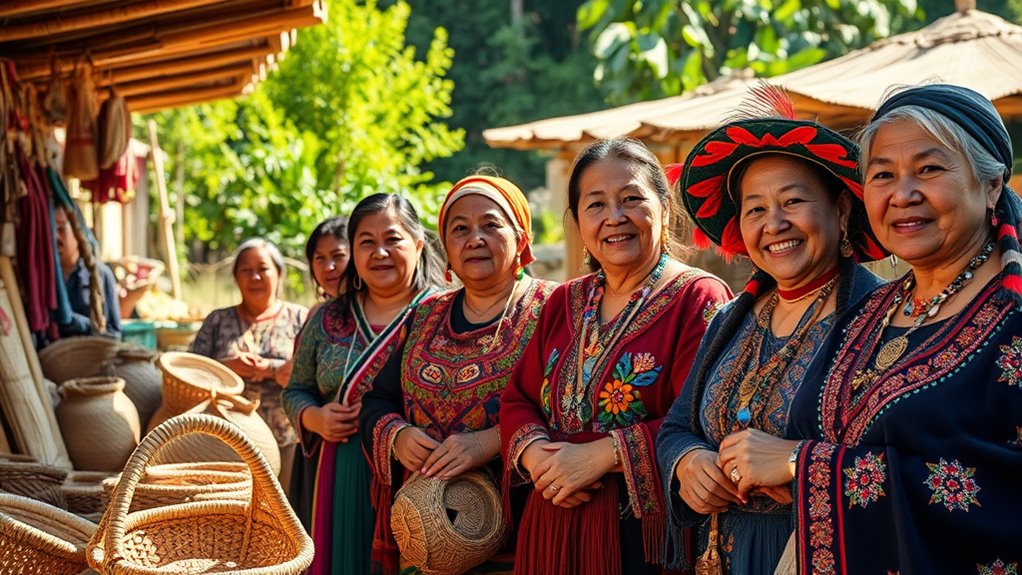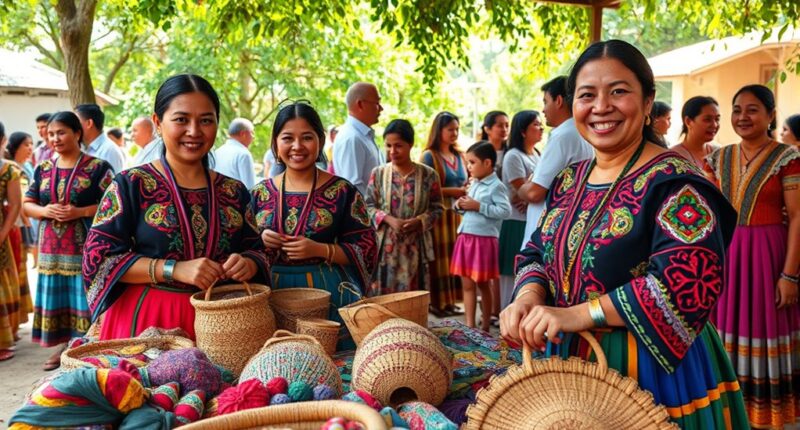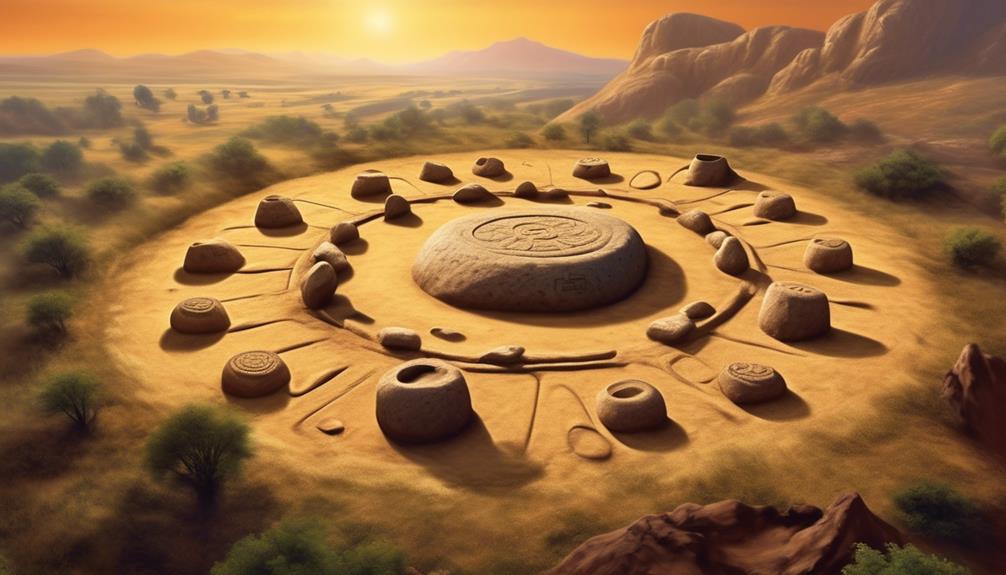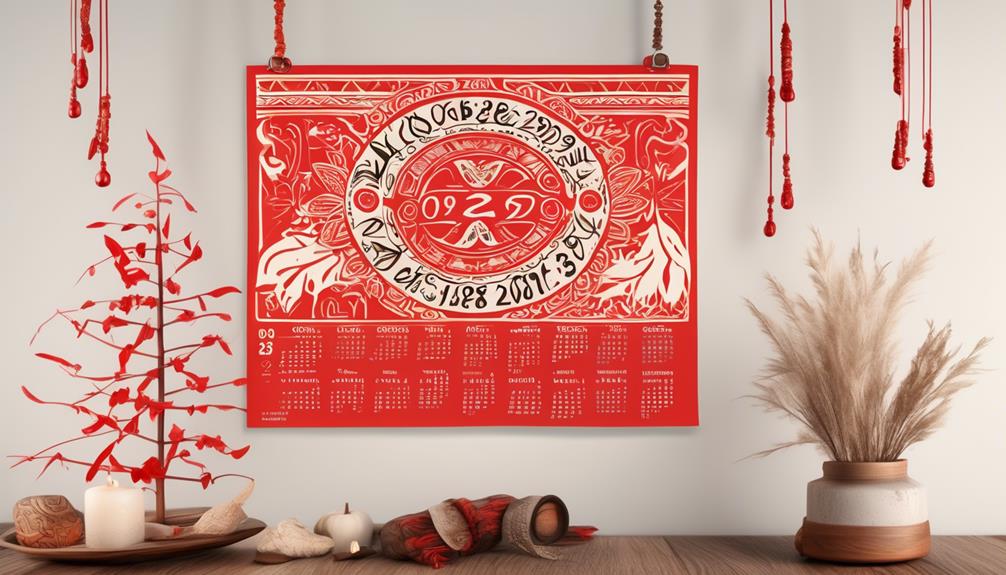Indigenous women entrepreneurs are transforming local economies by turning cultural heritage and traditional crafts into thriving businesses. They blend ancestral skills with modern designs and use digital platforms to reach global markets. This not only creates jobs and supports community development but also preserves their cultural identity. Their success showcases how entrepreneurship rooted in culture can foster economic empowerment. If you keep exploring, you’ll discover more about how these women are shaping vibrant, sustainable communities worldwide.
Key Takeaways
- Indigenous women entrepreneurs leverage cultural heritage and traditional crafts to create sustainable businesses that preserve their identities.
- They expand market reach through digital platforms, showcasing indigenous art globally and increasing economic opportunities.
- Their ventures support local economies by generating jobs, fostering craft markets, and promoting cultural tourism.
- Combining innovation with traditional techniques, they elevate indigenous skills and attract diverse consumer interest.
- Their entrepreneurial efforts empower communities, promote cultural preservation, and stimulate social and economic development.

Indigenous women entrepreneurs are breaking barriers and creating unique opportunities within their communities and beyond. By harnessing their cultural heritage, they’re not only building sustainable businesses but also preserving valuable traditions for future generations. One powerful way they achieve this is through the promotion of traditional crafts, which serve as a bridge between the past and the present. When you support their efforts, you’re helping to keep cultural practices alive that might otherwise fade away in an increasingly modern world. These women often turn ancestral skills into thriving enterprises, selling handcrafted items that reflect their unique identities and histories.
Through their dedication to cultural preservation, they’re redefining what it means to be an entrepreneur within indigenous communities. They recognize that traditional crafts aren’t just products—they’re stories, symbols, and expressions of their people’s identity. By incorporating these crafts into their businesses, they not only generate income but also foster pride and cultural continuity. This focus on authenticity resonates with consumers who seek meaningful, handcrafted items that carry cultural significance. As a result, their businesses often attract a global market enthusiastic for genuine indigenous art and craftsmanship.
Traditional crafts as stories and symbols that foster pride, cultural continuity, and global appreciation.
Many of these women are innovative in how they approach their craft, blending traditional techniques with contemporary designs to appeal to diverse audiences. They leverage social media and online platforms to reach customers beyond their local areas, creating new economic opportunities that weren’t possible before. This digital presence allows them to showcase their cultural heritage to a wider audience, promoting awareness and appreciation for indigenous art forms. Moreover, their entrepreneurial success inspires others in their communities, encouraging more women to pursue their passions while safeguarding their cultural identity.
By prioritizing cultural preservation through their traditional crafts, these women are also strengthening local economies. They create jobs, support local artisans, and stimulate small business growth within their communities. Their ventures often lead to the development of cooperative businesses, craft markets, and cultural tourism initiatives that benefit the community at large. Supporting these entrepreneurs means investing in a future where indigenous traditions thrive alongside economic development. It’s a powerful reminder that entrepreneurship, rooted in cultural pride, can serve as a catalyst for social and economic transformation.
In embracing their heritage and turning it into a source of income, these women are proving that cultural preservation and economic empowerment go hand in hand. Their work not only sustains their communities but also highlights the importance of respecting and valuing indigenous knowledge and skills in today’s global marketplace.
Frequently Asked Questions
How Do Indigenous Women Access Business Funding?
You can access business funding through programs that support cultural preservation and community support, which often prioritize Indigenous women entrepreneurs. Look for grants, microloans, and government initiatives designed specifically for Indigenous communities. Building strong local networks and partnerships also boosts your chances. Additionally, many organizations value your unique cultural perspective, making your business eligible for funding that fosters both economic growth and cultural preservation.
What Cultural Practices Influence Their Business Models?
You’re inspired by their rich cultural traditions and community rituals that shape their business models. These practices emphasize respect, collaboration, and sustainability, guiding how they create products and services. Their cultural values foster trust and strengthen community ties, making their businesses authentic and resilient. By weaving these traditions into their work, they build more meaningful connections with customers and ensure their enterprises thrive while honoring their heritage.
How Do They Navigate Legal Barriers in Entrepreneurship?
You navigate legal barriers by actively engaging in policy advocacy and building awareness about your challenges. You stay informed about relevant laws and leverage networks to push for reforms that support Indigenous women entrepreneurs. Collaborating with organizations and participating in community dialogues helps you address legal challenges effectively. By advocating for equitable policies, you empower yourself and others to overcome legal obstacles and grow your business sustainably.
What Mentorship Opportunities Are Available for Indigenous Women?
Imagine a fairy godmother waving her wand—except it’s community support and leadership development programs instead. You can access mentorship through local chambers of commerce, Indigenous business associations, or online platforms dedicated to women entrepreneurs. These opportunities foster leadership skills, connect you with experienced mentors, and strengthen your network. So, embrace these resources, and watch your business bloom as if under a magical spell of support and guidance.
How Do They Balance Traditional Roles With Entrepreneurship?
You balance traditional roles with entrepreneurship by integrating cultural preservation into your business practices and community leadership. You honor your heritage while innovating, ensuring your work reflects your values. You set boundaries that respect family and cultural commitments, empowering you to lead and inspire others. This harmony strengthens your identity and community, proving that traditional roles and entrepreneurship can coexist beautifully, enriching both your personal life and local economies.
Conclusion
As you witness these indigenous women entrepreneurs, remember the spirit of the resilient phoenix rising from the ashes. They’re not just transforming local economies; they’re rewriting history with each venture they undertake. Your support can be the wind beneath their wings, fueling their journey toward empowerment and sustainability. Just as the dawn follows darkness, their success signals a brighter, more inclusive future—proof that even in adversity, hope and innovation can flourish.









